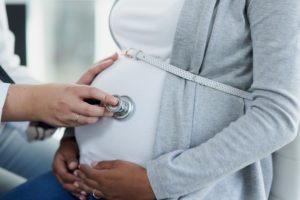 At Brigham and Women’s Hospital, the Division of Women’s Mental Health in the Department of Psychiatry has built a reputation for both its large faculty and its close collaboration with the departments of Obstetrics and Gynecology and of Newborn Medicine.
At Brigham and Women’s Hospital, the Division of Women’s Mental Health in the Department of Psychiatry has built a reputation for both its large faculty and its close collaboration with the departments of Obstetrics and Gynecology and of Newborn Medicine.
Women’s mental health is a subspecialty focusing on the distinct phenomenology of mental health needs associated with reproductive life events in women. Perinatal psychiatry, a large part of the division’s work, addresses women’s mental health needs related to pregnancy and childbirth.
“The Brigham has been devoted to the intersection of psychiatry and women’s health for years, even before our division was formalized in 2009,” explained Leena P. Mittal, MD, FACLP, director, Division of Women’s Mental Health. “We collaborate closely with Brigham obstetricians during and after pregnancy, providing both inpatient and outpatient consultation and working with them to develop specialized services.”
Working across many specialties to optimize women’s health relating to reproduction, specialized services and programs include:
- Clinical and research programs for patients who have a history of traumatic birth or are at risk for a complicated birth experience
- Services for patients with perinatal substance abuse disorders
- Psycho-oncology services that address the complexities of fertility preservation among young cancer patients
- Consultative psychiatry services that work with the Brigham’s reproductive endocrinology group to address infertility issues.
- Perinatal inpatient psychiatry services in development
- Collaborative mental health care services for women who have babies in the neonatal intensive care unit
The Brigham also is contributing to mental health innovation for perinatal women as the Boston hub for the statewide Massachusetts Child Psychiatry Access for Moms Program (MCPAP for Moms). Dr. Mittal, the program’s associate medical director, called the Brigham a natural choice to be the hub because of its collaborative relationships with obstetricians throughout eastern Massachusetts and its status as the state’s largest birthing center.
“The program is the first of its kind in the U.S. and is a model for development of similar psychiatry access programs in eight additional states,” said Dr. Mittal. “We are currently working on expanding MCPAP for Moms to increase providers’ capacity to serve patients with all perinatal mental health conditions, including substance use disorders.”
The Division of Women’s Mental Health also is part of interdepartmental efforts at the Brigham to improve the care of newborns and families affected by perinatal opioid use disorder as well as a statewide effort to improve the quality of newborn medicine care.
Faculty at the Brigham also participate in the National Curriculum on Reproductive Psychiatry, a nationwide task force of leaders in women’s mental health who are working together to create standards for residency education and develop reproductive psychiatry educational materials for other medical professionals.
Dr. Mittal added that she is excited about the future of perinatal mental health—and the Brigham’s leadership position in training the next generation of leaders through fellowships in women’s mental health and consultation-liaison psychiatry, which includes a special track in women’s mental health.
“Our faculty members are strong mentors and are inculcating interest in women’s mental health among our fellows,” Dr. Mittal concluded. “In fact, the mentorship of the Brigham faculty during my training was part of what prompted me to specialize in women’s mental health.”